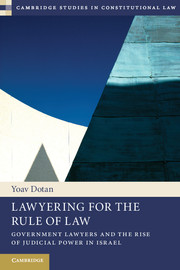Book contents
- Frontmatter
- Dedication
- Contents
- Acknowledgments
- List of figures
- List of tables
- Introduction The government’s lawyer
- 1 The Israeli legal system and the rise of judicial activism in the High Court of Justice
- 2 The High Court of Justice Department (HCJD): overview and history
- 3 Litigating for the government
- 4 The dilemma of serving two masters
- 5 Sorting things out: government lawyers in transformative litigation
- 6 The government lawyer as adjudicator: “pre-petitions” and the HCJD
- Conclusion
- Table of Cases
- Bibliography
- Index
4 - The dilemma of serving two masters
Published online by Cambridge University Press: 05 June 2014
- Frontmatter
- Dedication
- Contents
- Acknowledgments
- List of figures
- List of tables
- Introduction The government’s lawyer
- 1 The Israeli legal system and the rise of judicial activism in the High Court of Justice
- 2 The High Court of Justice Department (HCJD): overview and history
- 3 Litigating for the government
- 4 The dilemma of serving two masters
- 5 Sorting things out: government lawyers in transformative litigation
- 6 The government lawyer as adjudicator: “pre-petitions” and the HCJD
- Conclusion
- Table of Cases
- Bibliography
- Index
Summary
In the previous Chapter I demonstrated the implications of the changes in the ideology and practices of the HCJD on patterns of litigation. The rise of the model of lawyering for the rule of law inevitably gave rise to professional and ethical dilemmas between the lawyers’ duties to their client agencies and their commitment to broader ideas of the public interest. In the current chapter I discuss these dilemmas. I begin with a theoretical analysis based on three hypothetical test cases that illustrate these dilemmas. Then I examine these test cases from the point of view of various theories on government lawyers’ professional, ethical, and constitutional commitments. The theoretical overview is followed by a detailed empirical description of the views and practices espoused by the HCJD. That is, I demonstrate how the attitude of the HCJD towards this central dilemma changed throughout the 1980s. I then examine possible justifications for the existing model of lawyering in the HCJD from a normative point of view. In the last section I investigate the extent to which the professional ideology of individual lawyers influences actual practices and outcomes in litigation, and do so by using a quantitative analysis of outcomes in litigation in HCJ files.
- Type
- Chapter
- Information
- Lawyering for the Rule of LawGovernment Lawyers and the Rise of Judicial Power in Israel, pp. 119 - 146Publisher: Cambridge University PressPrint publication year: 2013

